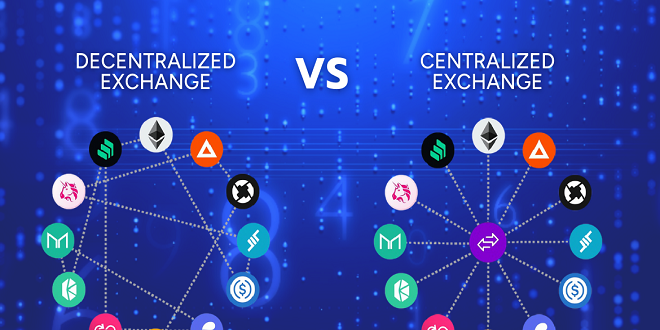The Pros of Using Centralised and Decentralised Cryptocurrency Exchanges

Cryptocurrency has become a popular investment option for many people in recent years. With the rise of Bitcoin and other cryptocurrencies, there has been an increasing demand for crypto exchanges. These exchanges provide a platform for users to buy, sell, and exchange cryptocurrencies quickly and easily. However, choosing the right cryptocurrency exchange can be a hard task for many.
This article will explore the pros of using centralised and decentralised crypto exchanges to help you decide which type of exchange is right for you.
Centralised Crypto Exchanges
Centralised crypto exchanges are operated by a single entity that manages the exchange. Beginners often use these exchanges as they are easy to use and have a user-friendly interface. In addition, centralised exchanges may require users to go through a Know-Your-Customer (KYC) process before the final registration. The advantages of centralised exchanges are mentioned below:
- High Liquidity
The main advantage of using a centralised crypto exchange is its high liquidity. These exchanges typically have many users and high trading volumes, making it easy to buy or sell cryptocurrencies. This means that traders can quickly execute their orders at the market price without worrying about price slippage, a common issue in decentralised exchanges with lower trading volumes.
- User-Friendly Interface
Centralised exchanges are designed to be user-friendly, with an intuitive interface that is easy to navigate. These exchanges typically offer a range of trading tools and features, such as market orders, limit orders, stop-loss orders, and margin trading, which are helpful for experienced traders. Hence, it is advisable to research and compare different exchanges before choosing the one that best suits your needs and preferences.
- Fast Transaction Times
Another advantage of centralised exchanges is the fast transaction times they offer. This is particularly important for traders who need to react quickly to changes in the market. Therefore, check the transaction times of the currencies you are interested in trading before choosing an exchange.
Decentralised Crypto Exchanges
Decentralised crypto exchanges operate on a peer-to-peer network, with no central authority controlling the exchange. These exchanges are gaining popularity due to their enhanced security and privacy features. Decentralised exchanges are built on blockchain technology, which means that transactions are recorded on a public ledger that is transparent and immutable. The advantages of decentralised exchanges are mentioned below.
- Enhanced Security
The main advantage of using a decentralised crypto exchange is enhanced security. Since these exchanges are decentralised, there is no single point of failure that hackers can exploit. This makes decentralised exchanges much more secure than centralised exchanges. Additionally, decentralised exchanges often allow users to retain control of their private keys, adding an extra security layer.
- Improved Privacy
Another advantage of using a decentralised crypto exchange is improved privacy. Since these exchanges are peer-to-peer, users do not need to reveal their identity to trade cryptocurrencies. This means that users can maintain their privacy while trading cryptocurrencies.
- Decentralised Governance
Decentralised exchanges are governed by the community of users who participate in the exchange. This means that decisions about the exchange are made by the community rather than by a central authority. This is important because it ensures the exchange is transparent and accountable to its users.
Conclusion
Both centralised and decentralised cryptocurrency exchange have their advantages. Centralised exchanges offer high liquidity, a user-friendly interface, and fast transaction times, making them ideal for beginners and experienced traders. Decentralised exchanges, on the other hand, offer enhanced security, improved privacy, and decentralised governance, making them an attractive option for users who prioritise security and privacy.





